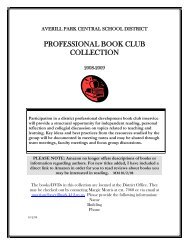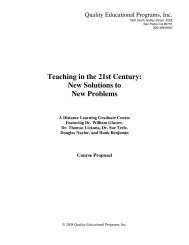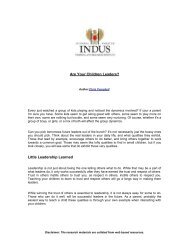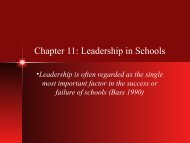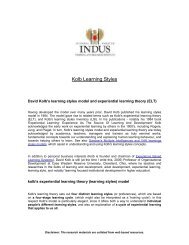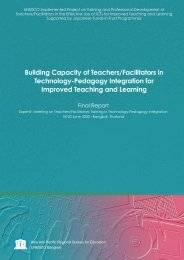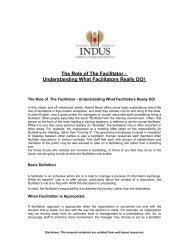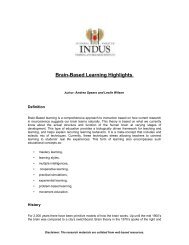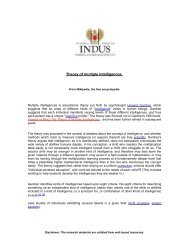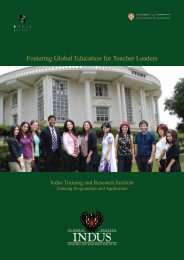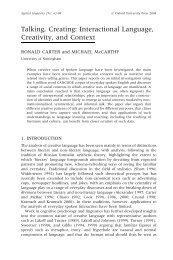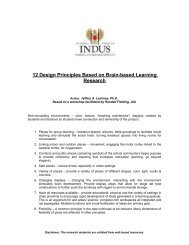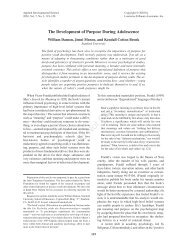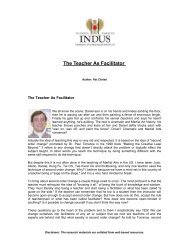Primary Years Programme Making the PYP happen - ITARI
Primary Years Programme Making the PYP happen - ITARI
Primary Years Programme Making the PYP happen - ITARI
- No tags were found...
Create successful ePaper yourself
Turn your PDF publications into a flip-book with our unique Google optimized e-Paper software.
<strong>Making</strong> <strong>the</strong> <strong>PYP</strong> <strong>happen</strong><br />
<strong>PYP</strong> key concepts What do we want <strong>the</strong> students to understand (subject perspectives)<br />
Concept<br />
Generic perspective<br />
Language perspective<br />
Ma<strong>the</strong>matics perspective<br />
Science and technology<br />
perspective<br />
Social studies perspective<br />
What is it like<br />
(Form)<br />
Everything has a form with<br />
recognizable features which can be<br />
observed, identified, described and<br />
categorized.<br />
Every language has a form which<br />
makes it unique.<br />
The recognition, categorization and<br />
description of patterns and o<strong>the</strong>r<br />
information.<br />
Most things have a form or shape<br />
with an outward or visible<br />
manifestation and an internal<br />
structure.<br />
Events, people and places have<br />
recognizable features which<br />
distinguish <strong>the</strong>m in time, space or<br />
social order.<br />
How does it work<br />
(Function)<br />
Everything has a purpose, a role or a<br />
way of behaving which can be<br />
investigated.<br />
Language is used for a variety of<br />
purposes depending on <strong>the</strong><br />
circumstances.<br />
The examination of systems,<br />
relationships, mechanics, components<br />
and patterns.<br />
The special activities, properties or<br />
purposes, natural or endowed, of a<br />
creature or thing.<br />
How events or relationships <strong>happen</strong><br />
among people or <strong>the</strong> interaction<br />
between people and <strong>the</strong> environment.<br />
Why is it like it is<br />
(Causation)<br />
Things do not just <strong>happen</strong>. There are<br />
causal relationships at work and<br />
actions have consequences.<br />
Language has an effect on, and is<br />
affected by, everything.<br />
The consideration of <strong>the</strong><br />
organization, process, application and<br />
consequences of actions.<br />
The effect brought about by an<br />
intended or unintended action or<br />
reaction.<br />
Human actions and events have<br />
causes, antecedents and consequences<br />
which affect how people interact with<br />
each o<strong>the</strong>r and with <strong>the</strong>ir<br />
environment.<br />
How is it changing<br />
(Change)<br />
The process of movement from one<br />
state to ano<strong>the</strong>r. It is universal and<br />
inevitable.<br />
Language is not static; it changes<br />
constantly.<br />
Looking for evidence of change,<br />
analysing change and making<br />
predictions.<br />
Change is an inevitable aspect of <strong>the</strong><br />
physical world as things become<br />
different or pass from one form or<br />
phase to ano<strong>the</strong>r. Change can be<br />
natural or brought about and<br />
accelerated by outside influences.<br />
Understanding <strong>the</strong> nature of social<br />
change (individual, group, cultural, or<br />
institutional), and how and why<br />
humans, over time and space, effect<br />
changes or respond to it.<br />
How is it connected to<br />
o<strong>the</strong>r things<br />
(Connection)<br />
We live in a world of interacting<br />
systems in which <strong>the</strong> actions of any<br />
individual element affect o<strong>the</strong>rs.<br />
Language is central to life. It is <strong>the</strong><br />
major connecting system within,<br />
between and among all societies.<br />
The examination of systems and<br />
strategies to identify different kinds<br />
and levels of relationships within and<br />
beyond <strong>the</strong> strands of ma<strong>the</strong>matics.<br />
The natural world is full of<br />
interacting systems in which parts<br />
and sets depend on each o<strong>the</strong>r to<br />
form a working whole.<br />
The social world comprises interacting<br />
systems in which <strong>the</strong> actions of<br />
individuals or groups affect each o<strong>the</strong>r<br />
and <strong>the</strong> environment. Events, people<br />
and places are part of an elaborate web<br />
of interdependent human systems.<br />
What are <strong>the</strong><br />
points of view<br />
(Perspective)<br />
What constitutes “knowledge”<br />
represents perspectives. Different<br />
perspectives lead to different<br />
understandings, interpretations and<br />
findings. Perspective may be<br />
individual, cultural or disciplinary.<br />
Language can be interpreted and<br />
meaning expressed in different ways.<br />
In ma<strong>the</strong>matics this means, “What are<br />
<strong>the</strong> different ways of looking at it” It<br />
is about <strong>the</strong> developing awareness of,<br />
and respect for, varied interpretations<br />
and <strong>the</strong> critical evaluation of<br />
explanations, strategies and solutions.<br />
Events and findings can be<br />
interpreted differently, depending on<br />
knowledge, experience and motives.<br />
The difference between empirically<br />
proven facts and supposition must be<br />
emphasized.<br />
There is no one right way of knowing.<br />
Perspective is influenced by o<strong>the</strong>r<br />
people, by our emotions, past<br />
experiences, needs and desires as well<br />
as by <strong>the</strong> influences of our culture and<br />
<strong>the</strong> disciplines.<br />
What is our responsibility<br />
(Responsibility)<br />
We are not passive observers of<br />
events. We can and must make<br />
choices. By doing so we can make a<br />
difference.<br />
Language is powerful and can have a<br />
profound effect, both positive and<br />
negative. Therefore, it must be used<br />
responsibly.<br />
Understanding <strong>the</strong> importance of<br />
accuracy and appreciating <strong>the</strong><br />
obligation to ga<strong>the</strong>r, interpret, report<br />
and apply data with honesty.<br />
We have a responsibility to <strong>the</strong> world<br />
in which we live. This involves being<br />
aware of how scientific knowledge<br />
can be used to improve or worsen <strong>the</strong><br />
quality of life of all living things.<br />
Responsibility entails action as well<br />
as awareness.<br />
People are not neutral and must<br />
consider <strong>the</strong>ir individual<br />
responsibilities towards <strong>the</strong>ir society<br />
and towards events and social issues.<br />
How do we know<br />
(Reflection)<br />
There are different ways of knowing.<br />
It is important to reflect on our<br />
conclusions, in terms of our way of<br />
reasoning and <strong>the</strong> quality and<br />
reliability of <strong>the</strong> evidence we have<br />
considered.<br />
Language is <strong>the</strong> means by which we<br />
reflect on our experiences and<br />
knowledge.<br />
Being able to communicate how we<br />
have come to understand an idea,<br />
concept or skill.<br />
We must consciously reflect on, and<br />
be able to describe, how we gain our<br />
knowledge and develop our attitudes.<br />
Reflecting on <strong>the</strong> ways of knowing<br />
about <strong>the</strong> past and o<strong>the</strong>r places and<br />
people involves introspection,<br />
empathy and <strong>the</strong> evaluation of sources<br />
for objectivity, omission and bias.<br />
Figure 6 Generic and subject-specific definitions of <strong>the</strong> key concepts<br />
© IBO 2000 19



